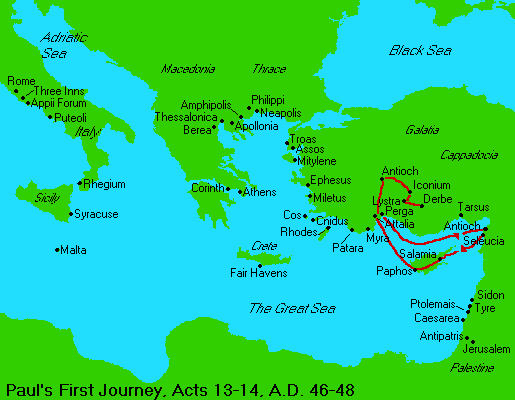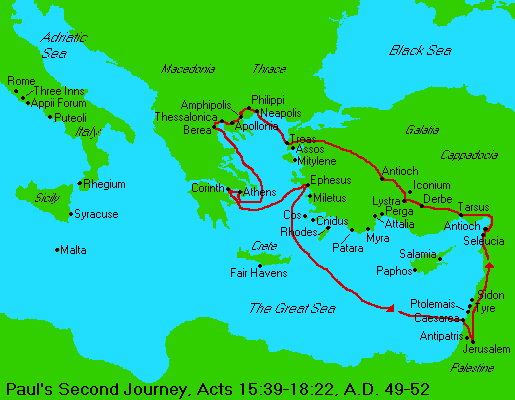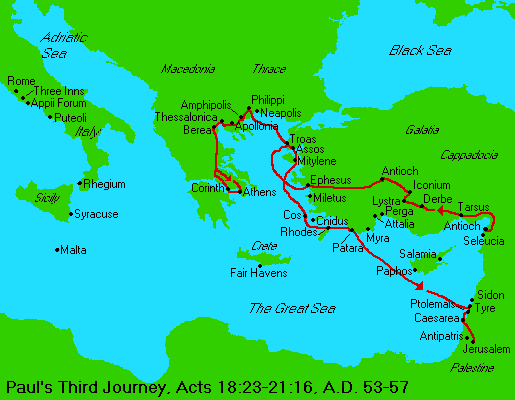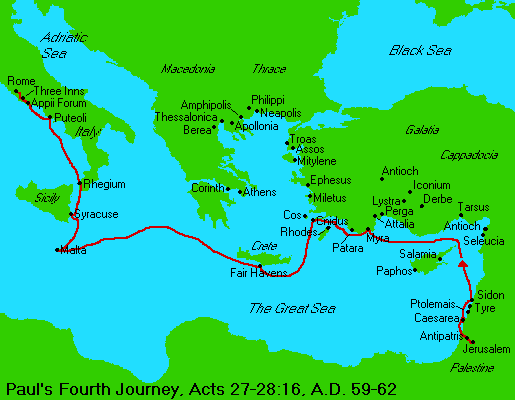Very viewable. Scroll past chronologies.
Journey 1 Journey 2 Journey 3 Journey 4

Description of Cities from Easton's Bible Dictionary
Seleucia
the sea-port of Antioch, near the mouth of the Orontes. Paul and
his companions sailed from this port on their first missionary
journey (Acts 13:4). This city was built by Seleucus Nicator,
the "king of Syria." It is said of him that "few princes have
ever lived with so great a passion for the building of cities.
He is reputed to have built in all nine Seleucias, sixteen
Antiochs, and six Laodiceas." Seleucia became a city of great
importance, and was made a "free city" by Pompey. It is now a
small village, called el-Kalusi.
Paphos
the capital of the island of Cyprus, and therefore the residence
of the Roman governor. It was visited by Paul and Barnabas on
their first missionary tour (Acts 13:6). It is new Paphos which
is here meant. It lay on the west coast of the island, about 8
miles north of old Paphos. Its modern name is Baffa.
Lystra
a town of Lycaonia, in Asia Minor, in a wild district and among
a rude population. Here Paul preached the gospel after he had
been driven by persecution from Iconium (Acts 14:2-7). Here also
he healed a lame man (8), and thus so impressed the ignorant and
superstitious people that they took him for Mercury, because he
was the "chief speaker," and his companion Barnabas for Jupiter,
probably in consequence of his stately, venerable appearance;
and were proceeding to offer sacrifices to them (13), when Paul
earnestly addressed them and turned their attention to the true
source of all blessings. But soon after, through the influence
of the Jews from Antioch in Pisidia and Iconium, they stoned
Paul and left him for dead (14:19). On recovering, Paul left for
Derbe; but soon returned again, through Lystra, encouraging the
disciples there to steadfastness. He in all likelihood visited
this city again on his third missionary tour (Acts 18:23).
Timothy, who was probably born here (2 Tim. 3:10, 11), was no
doubt one of those who were on this occasion witnesses of Paul's
persecution and his courage in Lystra.
Derbe
a small town on the eastern part of the upland plain of
Lycaonia, about 20 miles from Lystra. Paul passed through Derbe
on his route from Cilicia to Iconium, on his second missionary
journey (Acts 16:1), and probably also on his third journey
(18:23; 19:1). On his first journey (14:20, 21) he came to Derbe
from the other side; i.e., from Iconium. It was the native place
of Gaius, one of Paul's companions (20:4). He did not here
suffer persecution (2 Tim. 3:11).
Seleucia
the sea-port of Antioch, near the mouth of the Orontes. Paul and
his companions sailed from this port on their first missionary
journey (Acts 13:4). This city was built by Seleucus Nicator,
the "king of Syria." It is said of him that "few princes have
ever lived with so great a passion for the building of cities.
He is reputed to have built in all nine Seleucias, sixteen
Antiochs, and six Laodiceas." Seleucia became a city of great
importance, and was made a "free city" by Pompey. It is now a
small village, called el-Kalusi.

Seleucia
the sea-port of Antioch, near the mouth of the Orontes. Paul and
his companions sailed from this port on their first missionary
journey (Acts 13:4). This city was built by Seleucus Nicator,
the "king of Syria." It is said of him that "few princes have
ever lived with so great a passion for the building of cities.
He is reputed to have built in all nine Seleucias, sixteen
Antiochs, and six Laodiceas." Seleucia became a city of great
importance, and was made a "free city" by Pompey. It is now a
small village, called el-Kalusi.
Tarsus
the chief city of Cilicia. It was distinguished for its wealth
and for its schools of learning, in which it rivalled, nay,
excelled even Athens and Alexandria, and hence was spoken of as
"no mean city." It was the native place of the Apostle Paul
(Acts 21:39). It stood on the banks of the river Cydnus, about
12 miles north of the Mediterranean. It is said to have been
founded by Sardanapalus, king of Assyria. It is now a filthy,
ruinous Turkish town, called Tersous. (See PAUL)
Derbe
a small town on the eastern part of the upland plain of
Lycaonia, about 20 miles from Lystra. Paul passed through Derbe
on his route from Cilicia to Iconium, on his second missionary
journey (Acts 16:1), and probably also on his third journey
(18:23; 19:1). On his first journey (14:20, 21) he came to Derbe
from the other side; i.e., from Iconium. It was the native place
of Gaius, one of Paul's companions (20:4). He did not here
suffer persecution (2 Tim. 3:11).
Lystra
a town of Lycaonia, in Asia Minor, in a wild district and among
a rude population. Here Paul preached the gospel after he had
been driven by persecution from Iconium (Acts 14:2-7). Here also
he healed a lame man (8), and thus so impressed the ignorant and
superstitious people that they took him for Mercury, because he
was the "chief speaker," and his companion Barnabas for Jupiter,
probably in consequence of his stately, venerable appearance;
and were proceeding to offer sacrifices to them (13), when Paul
earnestly addressed them and turned their attention to the true
source of all blessings. But soon after, through the influence
of the Jews from Antioch in Pisidia and Iconium, they stoned
Paul and left him for dead (14:19). On recovering, Paul left for
Derbe; but soon returned again, through Lystra, encouraging the
disciples there to steadfastness. He in all likelihood visited
this city again on his third missionary tour (Acts 18:23).
Timothy, who was probably born here (2 Tim. 3:10, 11), was no
doubt one of those who were on this occasion witnesses of Paul's
persecution and his courage in Lystra.
Neapolis
new city, a town in Thrace at which Paul first landed in Europe
(Acts 16:11). It was the sea-port of the inland town of
Philippi, which was distant about 10 miles. From this port Paul
embarked on his last journey to Jerusalem (Acts 20:6). It is
identified with the modern Turco-Grecian Kavalla.
Berea
a city of Macedonia to which Paul with Silas and Timotheus went
when persecuted at Thessalonica (Acts 17:10, 13), and from which
also he was compelled to withdraw, when he fled to the sea-coast
and thence sailed to Athens (14, 15). Sopater, one of Paul's
companions belonged to this city, and his conversion probably
took place at this time (Acts 20:4). It is now called Verria.
Corinth
a Grecian city, on the isthmus which joins the Peloponnesus to
the mainland of Greece. It is about 48 miles west of Athens. The
ancient city was destroyed by the Romans (B.C. 146), and that
mentioned in the New Testament was quite a new city, having been
rebuilt about a century afterwards and peopled by a colony of
freedmen from Rome. It became under the Romans the seat of
government for Southern Greece or Achaia (Acts 18:12-16). It was
noted for its wealth, and for the luxurious and immoral and
vicious habits of the people. It had a large mixed population of
Romans, Greeks, and Jews. When Paul first visited the city (A.D.
51 or 52), Gallio, the brother of Seneca, was proconsul. Here
Paul resided for eighteen months (18:1-18). Here he first became
aquainted with Aquila and Priscilla, and soon after his
departure Apollos came to it from Ephesus. After an interval he
visited it a second time, and remained for three months (20:3).
During this second visit his Epistle to the Romans was written
(probably A.D. 55). Although there were many Jewish converts at
Corinth, yet the Gentile element prevailed in the church there.
Some have argued from 2 Cor. 12:14; 13:1, that Paul visited
Corinth a third time (i.e., that on some unrecorded occasion he
visited the city between what are usually called the first and
second visits). But the passages referred to only indicate
Paul's intention to visit Corinth (comp. 1 Cor. 16:5, where the
Greek present tense denotes an intention), an intention which
was in some way frustrated. We can hardly suppose that such a
visit could have been made by the apostle without more distinct
reference to it.
Ephesus
the capital of proconsular Asia, which was the western part of
Asia Minor. It was colonized principally from Athens. In the
time of the Romans it bore the title of "the first and greatest
metropolis of Asia." It was distinguished for the Temple of
Diana (q.v.), who there had her chief shrine; and for its
theatre, which was the largest in the world, capable of
containing 50,000 spectators. It was, like all ancient theatres,
open to the sky. Here were exhibited the fights of wild beasts
and of men with beasts. (Comp. 1 Cor. 4:9; 9:24, 25; 15:32.)
Many Jews took up their residence in this city, and here the
seeds of the gospel were sown immediately after Pentecost (Acts
2:9; 6:9). At the close of his second missionary journey (about
A.D. 51), when Paul was returning from Greece to Syria
(18:18-21), he first visited this city. He remained, however,
for only a short time, as he was hastening to keep the feast,
probably of Pentecost, at Jerusalem; but he left Aquila and
Priscilla behind him to carry on the work of spreading the
gospel.
During his third missionary journey Paul reached Ephesus from
the "upper coasts" (Acts 19:1), i.e., from the inland parts of
Asia Minor, and tarried here for about three years; and so
successful and abundant were his labours that "all they which
dwelt in Asia heard the word of the Lord Jesus, both Jews and
Greeks" (19:10). Probably during this period the seven churches
of the Apocalypse were founded, not by Paul's personal labours,
but by missionaries whom he may have sent out from Ephesus, and
by the influence of converts returning to their homes.
On his return from his journey, Paul touched at Miletus, some
30 miles south of Ephesus (Acts 20:15), and sending for the
presbyters of Ephesus to meet him there, he delivered to them
that touching farewell charge which is recorded in Acts
20:18-35. Ephesus is not again mentioned till near the close of
Paul's life, when he writes to Timothy exhorting him to "abide
still at Ephesus" (1 Tim. 1:3).
Two of Paul's companions, Trophimus and Tychicus, were
probably natives of Ephesus (Acts 20:4; 21:29; 2 Tim. 4:12). In
his second epistle to Timothy, Paul speaks of Onesiphorus as
having served him in many things at Ephesus (2 Tim. 1:18). He
also "sent Tychicus to Ephesus" (4:12), probably to attend to
the interests of the church there. Ephesus is twice mentioned in
the Apocalypse (1:11; 2:1).
The apostle John, according to tradition, spent many years in
Ephesus, where he died and was buried.
A part of the site of this once famous city is now occupied by
a small Turkish village, Ayasaluk, which is regarded as a
corruption of the two Greek words, hagios theologos; i.e., "the
holy divine."
Antipatris
a city built by Herod the Great, and called by this name in
honour of his father, Antipater. It lay between Caesarea and
Lydda, two miles inland, on the great Roman road from Caesarea
to Jerusalem. To this place Paul was brought by night (Acts
23:31) on his way to Caesarea, from which it was distant 28
miles. It is identified with the modern, Ras-el-Ain, where rise
the springs of Aujeh, the largest springs in Palestine.
Back to Top

Antioch
(1.) In Syria, on the river Orontes, about 16 miles from the
Mediterranean, and some 300 miles north of Jerusalem. It was the
metropolis of Syria, and afterwards became the capital of the
Roman province in Asia. It ranked third, after Rome and
Alexandria, in point of importance, of the cities of the Roman
empire. It was called the "first city of the East." Christianity
was early introduced into it (Acts 11:19, 21, 24), and the name
"Christian" was first applied here to its professors (Acts
11:26). It is intimately connected with the early history of the
gospel (Acts 6:5; 11:19, 27, 28, 30; 12:25; 15:22-35; Gal. 2:11,
12). It was the great central point whence missionaries to the
Gentiles were sent forth. It was the birth-place of the famous
Christian father Chrysostom, who died A.D. 407. It bears the
modern name of Antakia, and is now a miserable, decaying Turkish
town. Like Philippi, it was raised to the rank of a Roman
colony. Such colonies were ruled by "praetors" (R.V. marg., Acts
16:20, 21).
(2.) In the extreme north of Pisidia; was visited by Paul and
Barnabas on the first missionary journey (Acts 13:14). Here they
found a synagogue and many proselytes. They met with great
success in preaching the gospel, but the Jews stirred up a
violent opposition against them, and they were obliged to leave
the place. On his return, Paul again visited Antioch for the
purpose of confirming the disciples (Acts 14:21). It has been
identified with the modern Yalobatch, lying to the east of
Ephesus.
Ephesus
the capital of proconsular Asia, which was the western part of
Asia Minor. It was colonized principally from Athens. In the
time of the Romans it bore the title of "the first and greatest
metropolis of Asia." It was distinguished for the Temple of
Diana (q.v.), who there had her chief shrine; and for its
theatre, which was the largest in the world, capable of
containing 50,000 spectators. It was, like all ancient theatres,
open to the sky. Here were exhibited the fights of wild beasts
and of men with beasts. (Comp. 1 Cor. 4:9; 9:24, 25; 15:32.)
Many Jews took up their residence in this city, and here the
seeds of the gospel were sown immediately after Pentecost (Acts
2:9; 6:9). At the close of his second missionary journey (about
A.D. 51), when Paul was returning from Greece to Syria
(18:18-21), he first visited this city. He remained, however,
for only a short time, as he was hastening to keep the feast,
probably of Pentecost, at Jerusalem; but he left Aquila and
Priscilla behind him to carry on the work of spreading the
gospel.
During his third missionary journey Paul reached Ephesus from
the "upper coasts" (Acts 19:1), i.e., from the inland parts of
Asia Minor, and tarried here for about three years; and so
successful and abundant were his labours that "all they which
dwelt in Asia heard the word of the Lord Jesus, both Jews and
Greeks" (19:10). Probably during this period the seven churches
of the Apocalypse were founded, not by Paul's personal labours,
but by missionaries whom he may have sent out from Ephesus, and
by the influence of converts returning to their homes.
On his return from his journey, Paul touched at Miletus, some
30 miles south of Ephesus (Acts 20:15), and sending for the
presbyters of Ephesus to meet him there, he delivered to them
that touching farewell charge which is recorded in Acts
20:18-35. Ephesus is not again mentioned till near the close of
Paul's life, when he writes to Timothy exhorting him to "abide
still at Ephesus" (1 Tim. 1:3).
Two of Paul's companions, Trophimus and Tychicus, were
probably natives of Ephesus (Acts 20:4; 21:29; 2 Tim. 4:12). In
his second epistle to Timothy, Paul speaks of Onesiphorus as
having served him in many things at Ephesus (2 Tim. 1:18). He
also "sent Tychicus to Ephesus" (4:12), probably to attend to
the interests of the church there. Ephesus is twice mentioned in
the Apocalypse (1:11; 2:1).
The apostle John, according to tradition, spent many years in
Ephesus, where he died and was buried.
A part of the site of this once famous city is now occupied by
a small Turkish village, Ayasaluk, which is regarded as a
corruption of the two Greek words, hagios theologos; i.e., "the
holy divine."
Apollonia
a city of Macedonia between Amphipolis and Thessalonica, from
which it was distant about 36 miles. Paul and Silas passed
through it on their way to Thessalonica (Acts 17:1).
Berea
a city of Macedonia to which Paul with Silas and Timotheus went
when persecuted at Thessalonica (Acts 17:10, 13), and from which
also he was compelled to withdraw, when he fled to the sea-coast
and thence sailed to Athens (14, 15). Sopater, one of Paul's
companions belonged to this city, and his conversion probably
took place at this time (Acts 20:4). It is now called Verria.
Corinth
a Grecian city, on the isthmus which joins the Peloponnesus to
the mainland of Greece. It is about 48 miles west of Athens. The
ancient city was destroyed by the Romans (B.C. 146), and that
mentioned in the New Testament was quite a new city, having been
rebuilt about a century afterwards and peopled by a colony of
freedmen from Rome. It became under the Romans the seat of
government for Southern Greece or Achaia (Acts 18:12-16). It was
noted for its wealth, and for the luxurious and immoral and
vicious habits of the people. It had a large mixed population of
Romans, Greeks, and Jews. When Paul first visited the city (A.D.
51 or 52), Gallio, the brother of Seneca, was proconsul. Here
Paul resided for eighteen months (18:1-18). Here he first became
aquainted with Aquila and Priscilla, and soon after his
departure Apollos came to it from Ephesus. After an interval he
visited it a second time, and remained for three months (20:3).
During this second visit his Epistle to the Romans was written
(probably A.D. 55). Although there were many Jewish converts at
Corinth, yet the Gentile element prevailed in the church there.
Some have argued from 2 Cor. 12:14; 13:1, that Paul visited
Corinth a third time (i.e., that on some unrecorded occasion he
visited the city between what are usually called the first and
second visits). But the passages referred to only indicate
Paul's intention to visit Corinth (comp. 1 Cor. 16:5, where the
Greek present tense denotes an intention), an intention which
was in some way frustrated. We can hardly suppose that such a
visit could have been made by the apostle without more distinct
reference to it.
Athens
the capital of Attica, the most celebrated city of the ancient
world, the seat of Greek literature and art during the golden
period of Grecian history. Its inhabitants were fond of novelty
(Acts 17:21), and were remarkable for their zeal in the worship
of the gods. It was a sarcastic saying of the Roman satirist
that it was "easier to find a god at Athens than a man."
On his second missionary journey Paul visited this city (Acts
17:15; comp. 1 Thess. 3:1), and delivered in the Areopagus his
famous speech (17:22-31). The altar of which Paul there speaks
as dedicated "to the [properly "an"] unknown God" (23) was
probably one of several which bore the same inscription. It is
supposed that they originated in the practice of letting loose a
flock of sheep and goats in the streets of Athens on the
occasion of a plague, and of offering them up in sacrifice, at
the spot where they lay down, "to the god concerned."
Cnidus
a town and harbour on the extreme south-west of the peninsula of
Doris in Asia Minor. Paul sailed past it on his voyage to Rome
after leaving Myra (Acts 27:7).
Caesarea
(Palestinae), a city on the shore of the Mediterranean, on the
great road from Tyre to Egypt, about 70 miles northwest of
Jerusalem, at the northern extremity of the plain of Sharon. It
was built by Herod the Great (B.C. 10), who named it after
Caesar Augustus, hence called Caesarea Sebaste (Gr. Sebastos =
"Augustus"), on the site of an old town called "Strato's Tower."
It was the capital of the Roman province of Judaea, the seat of
the governors or procurators, and the headquarters of the Roman
troops. It was the great Gentile city of Palestine, with a
spacious artificial harbour. It was adorned with many buildings
of great splendour, after the manner of the Roman cities of the
West. Here Cornelius the centurion was converted through the
instrumentality of Peter (Acts 10:1, 24), and thus for the first
time the door of faith was opened to the Gentiles. Philip the
evangelist resided here with his four daughters (21:8). From
this place Saul sailed for his native Tarsus when forced to flee
from Jerusalem (9:30), and here he landed when returning from
his second missionary journey (18:22). He remained as a prisoner
here for two years before his voyage to Rome (Acts 24:27; 25:1,
4, 6, 13). Here on a "set day," when games were celebrated in
the theatre in honour of the emperor Claudius, Herod Agrippa I.
appeared among the people in great pomp, and in the midst of the
idolatrous homage paid to him was suddenly smitten by an angel,
and carried out a dying man. He was "eaten of worms" (12:19-23),
thus perishing by the same loathsome disease as his granfather,
Herod the Great. It still retains its ancient name Kaiseriyeh,
but is now desolate. "The present inhabitants of the ruins are
snakes, scorpions, lizards, wild boars, and jackals." It is
described as the most desolate city of all Palestine.
Back to Top

Antipatris
a city built by Herod the Great, and called by this name in
honour of his father, Antipater. It lay between Caesarea and
Lydda, two miles inland, on the great Roman road from Caesarea
to Jerusalem. To this place Paul was brought by night (Acts
23:31) on his way to Caesarea, from which it was distant 28
miles. It is identified with the modern, Ras-el-Ain, where rise
the springs of Aujeh, the largest springs in Palestine.
Sidon
fishing; fishery, Gen. 10:15, 19 (A.V. marg., Tzidon; R.V.,
Zidon); Matt. 11:21, 22; Luke 6:17. (See ZIDON)
Cnidus
a town and harbour on the extreme south-west of the peninsula of
Doris in Asia Minor. Paul sailed past it on his voyage to Rome
after leaving Myra (Acts 27:7).
Fair Havens
a harbour in the south of Crete, some 5 miles to the east of
which was the town of Lasea (Acts 27:8). Here the ship of
Alexandria in which Paul and his companions sailed was detained
a considerable time waiting for a favourable wind. Contrary to
Paul's advice, the master of the ship determined to prosecute
the voyage, as the harbour was deemed incommodious for wintering
in (9-12). The result was that, after a stormy voyage, the
vessel was finally wrecked on the coast of Malta (27:40-44).
Syracuse
a city on the south-east coast of Sicily, where Paul landed and
remained three days when on his way to Rome (Acts 28:12). It was
distinguished for its magnitude and splendour. It is now a small
town of some 13,000 inhabitants.
Rhegium
breach, a town in the south of Italy, on the Strait of Messina,
at which Paul touched on his way to Rome (Acts 28:13). It is now
called Rheggio.
Puteoli
a city on the coast of Campania, on the north shore of a bay
running north from the Bay of Naples, at which Paul landed on
his way to Rome, from which it was distant 170 miles. Here he
tarried for seven days (Acts 28:13, 14). This was the great
emporium for the Alexandrian corn ships. Here Paul and his
companions began their journey, by the "Appian Way," to Rome. It
is now called Pozzuoli. The remains of a huge amphitheatre, and
of the quay at which Paul landed, may still be seen here.